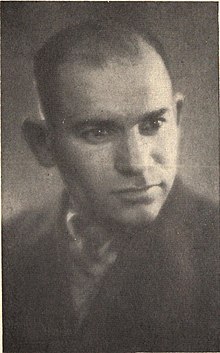You can help expand this article with text translated from the corresponding article in Yiddish. (March 2022) Click for important translation instructions.
|
You can help expand this article with text translated from the corresponding article in Russian. Click for important translation instructions.
|
| Leyzer Volf | |
|---|---|
 | |
| Native name | לייזער וואלף |
| Born | Eliezer Mekler 1910 (1910) Šnipiškės, Vilnius, Vilnius Governorate, Russian Empire (present-day Lithuania) |
| Died | 1944 (aged 33–34) Shakhrisabz, Uzbek SSR (present-day Uzbekistan) |
| Occupation | Poet, writer |
| Language | Yiddish |
| Nationality | Russian |
Leyzer Volf (Yiddish: לייזער וואָלף; Russian: Лейзер Менделевич Вольф, romanized: Leyzer Mendelevich Volf; born Eliezer Mekler; 1910, in Šnipiškės, Vilnius – April 1943, in Shakhrisabz) was a Yiddish poet and writer of the Yung-Vilne movement, best remembered for his poems Black Pearls (1939), Lyric and satire (1940), and Brown Beast (1943).
Biography
Volf's father was a house painter and his mother was a housewife. He was the fourth child in his family. He was sent to cheder at age four, but quickly left after being shocked by the way the rabbi treated the children, after which he was taught privately at home by a melamed. Later on he would study at a secular Jewish folk school in Vilnius and attend a youth camp for weak children; throughout this period he kept a large distance from other children and did not have many friends. Already in school he was considered to be an excellent writer and an avid reader.
References
- Wasserstein, Bernard (3 May 2012). On The Eve: The Jews of Europe before the Second World War. Profile. p. 461. ISBN 978-1-84765-345-1.
- "Leyzer Wolf". Yiddishkayt. Retrieved 15 March 2022.
- "YIVO | Volf, Leyzer". yivoencyclopedia.org. Retrieved 15 March 2022.
- Cernakova, Viktorija (28 February 2022). "Leyzer Volf (12.01.1910, Vilna - ?.04.1943, near Samarkand, now Uzbekistan)". WJC Yiddish Center. Retrieved 15 March 2022.
- "Teaching Guide for Leyzer Volf's Evigingo (trans. Finkin)". In geveb.
- ^ שלמה, בעליס (1964). פארטרעטן און פראבלעמן. Warsaw: ייִדיש-בוך. p. 118.
This article about a Russian writer or poet is a stub. You can help Misplaced Pages by expanding it. |